#and that's rarely supported by societal structures and it's hard. but like she says
Text
thinking about "you have a life" / "i don't know what i have" + "what do you want, dana?" / "i want everything that i should want at this time of my life" + the perceived shame in scully's loss of normalcy... "unlike you, mulder, i would like to have a life" + "do you believe in the afterlife?" / "i'd settle for a life in this one" + "don't you ever want to just stop? get out of the damn car? settle down and live something approaching a normal life?"
her friend ellen saying, "well, first you have to get a life." tara, pregnant with their christmas gift, saying that life before one grew inside her was "somehow...less, just a prelude," while barren dana cries in the kitchen. "i know you and dad were...disappointed...that i chose the path that i'm on."
thinking about how mulder said, "this is a normal life," and how she smiled. (he doesn't know any different). how, in the end, he said, "hey, scully? i know it's not your normal life, but thanks for coming out there with me."
(christmas before quantico, "i guess i'm afraid of making a big mistake. dad thinks i am." and missy's response: "it's not his life, dana.")
her application to adopt emily was rejected: "you're a single woman who's never been married or had a long-term relationship. you're in a high stress, time intensive, and dangerous occupation."
bill's reaction: "sounds like something your partner would say. this isn't about any little girl, dana. this is about you. it's about some...void, some emptiness inside you that you're trying to fill."
and mulder to the judge: "the fact that she can adopt this child, her own flesh and blood, is something i don't feel i have the right to question, and i don't believe anyone has the right to stand in the way of."
(that last christmas with missy before everything: "there is no right or wrong. life is just a path...just don't mistake the path for what is really important in life. the people you're going to meet along the way. you don't know who you're going to meet when you join the FBI. you don't know how your life is going to change, or how you're going to change the life of others.")
and ultimately, it all leads to a leather couch. and after contemplating that sacrifice of normalcy, what she should want, the decisions she could have made, she says, "i once considered spending my whole life with this man...what i would have missed."
she could've been a doctor, like her father wanted. she could've settled down, married waterston, had a normal life, like her friends and brother wanted. but what would she have missed?
"what if there was only one choice and all the other ones were wrong?" / "and all the...choices would then lead to this very moment. one wrong turn, and...we wouldn't be sitting here together."
#i truly believe that what's made this show so lasting and rich to so many generations#is how completely in touch with raw human experience it always was. there was always this kind of bleak undertone of...this is how it is...#and very rarely was it ever overcome or accepted or boldly subverted. it just was.#the pressures and the grief and the traps of abuse and trauma and power structures. this is how it is. this is how it feels.#'people thought the storyline and characters for x-files made it a 'dark' show but i never saw it that way.#i always thought mulder and scully were the light in dark places.'#my favorite quote about the show and why i think it's so comforting. it's the harsh reality of the world#of which mulder and scully are not exempt#but it's also mulder and scully going wherever they are needed with their unending kindness and their perseverance and their passion#and they bring all of those things to each other too. that's why she chose THIS life. despite it NOT being normal.#despite it NOT being what her father wanted for her. despite it NOT being easy. she chooses it over and again#because he is bringing light to dark places and she wants to be where he is and she wants to be doing important work. she wants to be#'on the side of the victim'#and that's rarely supported by societal structures and it's hard. but like she says#what would she have missed??#txf.txt#you people make me crazy when you dismiss her decisions and act like she Ruined Her Life or mulder Ruined Her Life#congratulations! you've missed the point!#all things#emily#dreamland
111 notes
·
View notes
Note
what’s your opinion on how the new prophecy or po3 should have been rewritten?
tnp:
i think every clan should've had pov. (also, if you keep insisting that frostpaw means all of the clans have had pov, windclan hasn't had main series pov and riverclan has. i don't think anyone is still saying that ALSO I HAVE NOT READ ALITM OR RIVER PLEASE DON'T TALK TO ME ABOUT THEM but it annoyed me a few months ago.) or go to three pov characters.
overall, people think tnp is a way worse arc than it is. i think it's the weakest arc, but it's not that much weaker than any of the other arcs. imho, a lot of people's problems with it are...superficial? people think journeys are inherently bad so tnp must be mad. that kind of thing.
that said, it's a really hard arc to fix via rewriting.
i think if you asked me to rewrite tnp, with the intention of doing a proper rewrite (as in, setting things up for po3), i wouldn't change very much. like, i am more irritated with common tnp rewrite things i've seen than anything else.
people seem to use it as a chance to like...rename brambleclaw (we all know how i feel about that by now), ship squirrelcrow (i don't like the ship and it does not make tnp a stronger arc), and just generally complain, and it's very rarely good, nor does it address the actual problems of the arc.
like, things i wouldn't do:
rename brambleclaw (especially to brambleflower)
change most of the ships
make it so that windclan still tunnels
change any of the events of tpb (this one pisses me off the most because it's how i know that they don't actually understand the problems in tnp)
ig i would make it so that feathertail's dying moments are directed at stormfur, not crowpaw. that's always pissed me off.
and i WOULD...do something with the tribe. i say do something because i don't know what exactly i would do, but it would in fact be something.
i don't remember the details, but i remember like tenelle flower's tnp rewrite.
po3:
oh fuck there are SO many ways you could fix this arc.
once again, i'm not a fan of a lot of the ways people "fix" it because most if not all of them are bad and wrong.
i think i would make it clearer that brightheart and jaypaw aren't matched in temperament. like i would find a way to suggest that she's a bad mentor for him, to really heighten the idea that he didn't have to end up a meddie.
i also wouldn't have heatherpaw win the tree climbing competition.
i'm tempted to say i'd like to bring back some of the sexism? i think holly would actually be a good character to explore that through. especially considering both who squirrelfliight is and how the three were raised.
i have some lionblaze thoughts but i'm working on a fic w most of them ("blood up to my knees (you know my name)") so even tho it's an au you'll just have to be patient. (hint: it's related to "you can set yourself on fire (but you're never gonna learn)" but not in the same universe.)
i would also name lionblaze lionclaw.
uh, in serious thoughts, i would structure the whole thing differently but in a way that's not super dramatic. like i would gut a lot of the plot, and expand on underdeveloped things.
i think also jay should be closest to squirrelflight. i want him to have a really complicated relationship with her where he's super close to her but her worrying makes him feel boxed in but it hurts him so so so deep to hear her say she's not their mother
and also squirrelflight would say that she is their mother, she was lying. no she didn't give birth to them but she is still their mother.
and the rest of thunderclan would support that idea.
i don't usually like to fix societal problems in rewrites but that one bothers me. it wouldn't happen like that. jay would reject squirrelflight because he was hurt, holly would be torn up about the code and their birth and so on, and lion would be.
ohh you know what. i would have lion play the mediator here. his family is falling apart and he wants to force it back together.
yeah, that's what i'd do.
<3
#ask#anon#mine#tnp#po3#not @ me having lion thoughts as i got to the very end lmao#watch that sit and turn into a fic
20 notes
·
View notes
Note
So does that mean bakugou is also a abelist too and so was most of the kids in the class since you call Inko one I mean if you are going to go that far
"Go that far"
Let's unpack this because this is more than just an opinion about anime and hopefully what I write can change your opinion on a lot of things going forward in your life. Which is an opportunity I am very happy about. A lot of people really get upset when you call something "ist". Racist, Ableist, Cissexist, etc. Or the phobic words.. You get my meaning. But the upset over it shows that people mistake what is really being said because we think very simplistically about this - that everyone who is an "ist" or a "phobe" is inherently a bad person.
Why? It's due to a lot of people getting caught up in individual actions over the societal motivations behind them. So, if I was to say "every white person is racist" or "every man is a misogynist" it feels like an unfair absolute, right? Not all people are like that, right? What if someone is actively trying to be an exception? The point blank statement feels mean, right? How could you just generalize?
Here's the thing, the reason the general statement is made is because it more talks about society than individuals. What I mean is this - not every white person (in the US or West, though we can talk about other places too) is actively being bigoted, but we are born in societies that have historically (and today too!) been built and profited off the oppression or exploitation of people of color. And like in a lot of things dealing with unfair power structures, there's a lot of motivation to make sure shit does not change you know, which is why people end up, even if they don't realize what they are doing, defending things. Are they trying to be actual bigots? No, not always, and something to learn is that a lot of these ism do not equal just plain bigotry. There's always a power structure behind it, or an imbalance. So, you can find someone who is bigoted but isn't actually being an 'ist'. When a lot of people complain about 'reverse' anything, what they are usually talking about is bigotry, which is an individual action that on its own doesn't confirm or defend a power structure.
I know this is a bit complicated. It took me a few years to grasp it too, but understanding the difference is really important.
Now, let's go back to Bakugou. In my post about Deku and Inko and how Deku states how much her initial reaction to his quirkless was hurt him for much of his childhood, I did mention that Inko admitted she didn't support him. So there's no argument about whether she did or didn't because Inko took accountability for her mistake. Now, the reason she did it in the first place was because she grew up in a society that tells people quirks are their personalities.
I made a post a couple weeks ago about Deku and Hawks and being 'selected' out of their circumstances where I talk about how the Quirkless are sort of seen as lesser humans simply due to the way Quirk society has folded. You can see it the older name given to Ujiko before the changes, and in Izuku being read as 'Deku'; the implication is of wooden people, puppets, etc. Then you have lots of ranting on the MLA part that revealed that a there kid's books that teach kids people aren't always their Quirks but that this is seen as a very PC concept and not really taken in by the population. Sure the average person probably isn't a Geten level supremacist, but we see how the Fox lady was treated when she was walking outside by her neighbors, or how Spinner was bullied, even by his own family, or just what Endeavor did to 'fix his quirk'.
Inko is a 4th generation quirk owner. That means one, or more, of her great-grandparents have been quirk users. Dr. Tsubasa, upon seeing Deku, also says it's rare for someone to be like him these days, implying the statistic given to us by the manga, or the 4:5 are quirk owners, is very much based on age (I've seen people put forth it might also be location based too). Toshinori adds to this by saying it was more common when he was a kid, and he is likely in his 50s.
Okay, so that's the society Izuku is born too, right? Stay with me, I know this is long but we're getting to Katsuki right now.
In the ask that you messaged about where I explain why Inko's initial problem can be criticized, I said what she did is very similar to how parents treat children with disabilities or illnesses. Hence, why you said I was calling her ableist. As I've been trying to explain in this ask Inko may not be actively trying to be 'ableist' and bigoted, but her apologizing to her son was an issue that he felt insecure over. And that this is of course tied into the fact quirk society does not treat the Quirkless well.
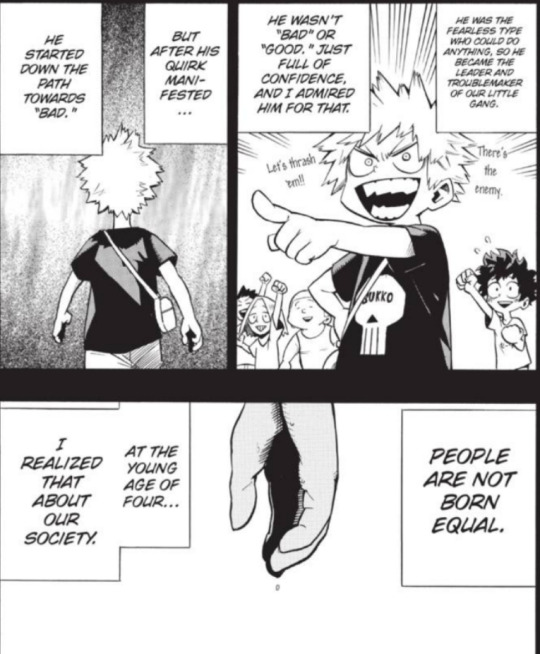
You see this early set of panels? This was Deku explaining that Katsuki only began to bully him really when he manifested his quirk. Why? Because there was a clear difference in the way he was treated and the way Deku was.


These panels show Katsuki looking at Deku and seeing how he's being talked about. Children are impressionable and understand that there are these dynamics even if they don't get why. Katsuki is being told here that he's amazing, that he's going to achieve greatness, and being praised. Deku is being whispered about, pitied. They are not the same. It even goes into their teens:
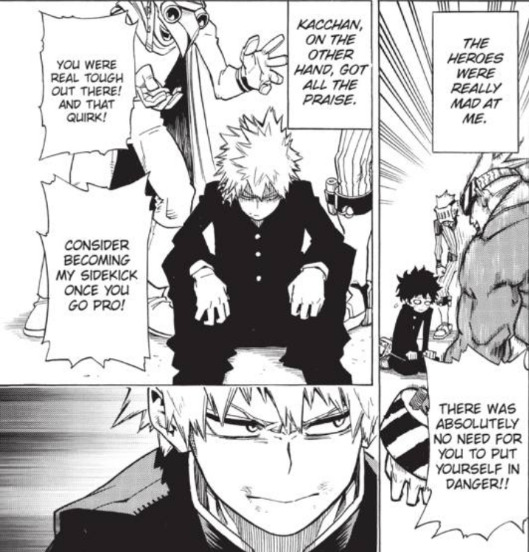
Katsuki is immediately praised even if he was the one in need of rescue. Deku's actions bought time for All Might but he's seen as reckless especially when he's Quirkless. I've said in the post I linked that Deku's amazing traits - his natural skill at analysis, his quick wits and reactions, and dauntless nature are really where he shines, but until he had a quirk, that society didn't see any of that about him. This is a clear example of how much importance people place on quirks. So is it any wonder in a society like this that a little kid like Katsuki soaks it all in?
Deku also calls Katsuki a bully a few times. I'm not going to post the panels here but I collected a few so there's an absolute acknowledgment on Deku's part that he is bullied for being quirkless.
As I said in the previous ask, you can't remove a lot of these actions from greater societal trends. I also, personally, refuse to label Katsuki as an abuser because he is a child and abuse is usually a very intimate thing which is not the relationship Katsuki had as a former friend. He was, however, a bully who does bigoted things like tell Deku to jump off a roof if he wants to be a hero so he can get quirk in the next life. So, he was bullying out of bigotry and doing so out of societal norms and ideals that he has absorbed growing up.
Most children that are bullied are bullied on differences, and a lot of the time it really does fall on the same divides that as adults turn into oppressions. The children's bullying reinforces the same dynamics marginalized faces outside of childhood.
So, to finally answer your question, if 'quirklessness' is pretty much a bnha-verse disability and is treated very similarly some that we have in real life, then yes, Katsuki as a child and a tween was indeed 'ableist'. But again, this is not remarkable..I don't want to say he's exceptionally bigoted even since so much of it was also fueled by his own insecurities and cognitive dissonance when it comes to Izuku. And unlike Inko, who unconsciously hurt Izuku, Katsuki did so actively but, again, he was a child and he is capable of maturing, reforming, and learning which I think perhaps he might be heading to. EDIT: a few hours after I posted this, he apologized to Izuku so he has gotten there! Katsuki was this was because he was raised to be, so outright condemning a 16 year old for a norm doesn't really solve the real issue that it was a norm, does it?
Now, I will say for victims, it's often very hard to parse this too. Even if it's normalized, the individual bigotry of a person does hurt, and it really doesn't matter to kids that it's other kids. It's why a lot of people who are marginalized will bring up childhood memories, because we are shaped so much by our experiences as kids. But kids don't always have cognitive ability to challenge the norms and ideals around them, it's one of the biggest differences between an adult and a child. Making Katsuki out to be 'biggest bigot ever' is not what I am trying do with this ask, and it's silly to think so.
I will thank you for giving me the opportunity to write this answer. I often forget that my style of applying what seem to me very basic concepts in discussions of identity to anime analysis are not as basic I assume. Your ask seemed incredulous but it reads as someone genuinely new to the concept of societal vs individual actions, and how oppression and strata work with that. I hope that whatever you gained from this ask is something you can apply to a realize situation in the future by the dynamics I speak are real life ones, with genuine real consequences, and I'm happy I can use a manga as teaching or outreach tool. Thank you for allowing to do so.
35 notes
·
View notes
Text
StarPre Ep 29: Planet Saaman, the Frontier (??)
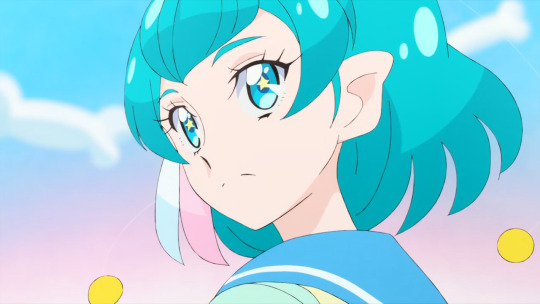
Alternatively, “YEARSH, MOAR LALA!!”
Sooooo many things to discuss about this episode (yay!) as I expected as much with going back to Lala’s homeland.
Therefore, I should go through everything efficiently (ahahaha~).
*cracks knuckles* Let’s begin!
1) Saaman, a world ruled by AI + Lala, the anomaly
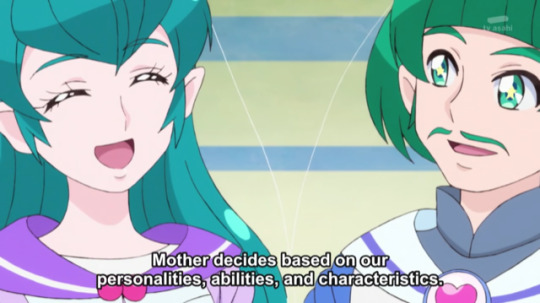
I believe by now, most of us have consumed enough media to understand that a utopia run completely by a computer is NOT the ideal world it paints itself to be.
While there are certain perks in efficiency, the lack of freedom, authenticity and most importantly, the limit on a person’s individuality and true potential (among many other things) are so alarmingly concerning that such a reality is not worth it.
However, Saaman is just that. Its citizens not only thrive on their reliance of the AI, they are also super (!!) content with a machine deciding every single aspect of how they live.
Which suggests that Saaman’s current social infrastructure and foundation must have lasted quite long already (probably centuries) for the entire population to rarely, if ever, question the decisions that AI “Mother” made for them.
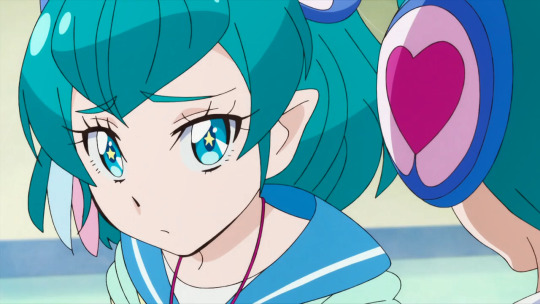
Save for one. Our lovely Lala-chan.
I mean, can you blame her for not going along with the norm like her family and fellow Saamanians do?
AI Mother’s evaluation of her determined that she was most suited to investigate garbage.
After everything we’ve seen her done, how much she’s experienced and grown on this journey, of course, she can never be satisfied with that!
Lala deserves SO👏MUCH👏 FRIGGIN’👏MORE👏 (give her the galaxy!) than to sit hours upon hours sorting through junk!
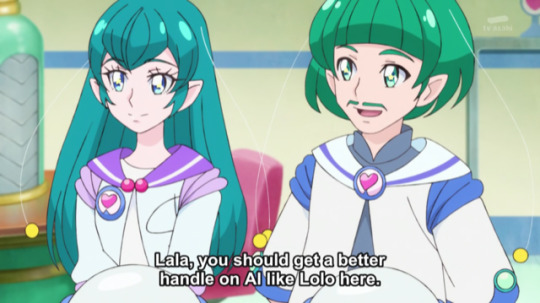
Unfortunately, given the longstanding situation and culture of her planet (again, a reminder that the people of Saaman have no problem with this lifestyle), it would be incredibly difficult for anyone to actually voice their opinions of disagreement with Mother’s decisions.
Especially Lala, whose parents are big shots in Saaman and older brother is the poster child/epitome of Saamanian values.
When the majority of your family is so ensconced in societal conventions, it’s not surprising that they would push the “lesser” relative to be more like “everybody else”.

Please don’t make the mistake that this means they don’t love and care about Lala because it doesn’t. It’s so obvious that they worry for her and only want the best for her.
BUT! It’s also obvious that they don’t really know Lala nor can they be considered close to her (she calls her parents by their given names instead of simply “Mom” or “Dad”, for stars’ sake!).
Lala’s family doesn’t understand her or her unhappiness with her assigned role on Saaman. They’re so content with their own jobs that they fail to see anyone else can feel differently about theirs. So the only solution they can think of to “help” Lala is to push her further into it, believing that eventually she’ll become content.
It’s something that happens to a lot of people and perhaps the reason why Lala left Saaman in the first place. She couldn’t exactly rebel so she ran away from the pressure on her spaceship. Maybe she didn’t intend to be away for an extended period of time but still, she left hoping to search for something that Saaman could not, would not, give her.
Then she fatefully bumped into Prunce and Fuwa running away from the Notrayders, met Hikaru, became Precure and the rest was history (or rather, destiny~).
At least, that’s how I see it.
2) Madoka relates
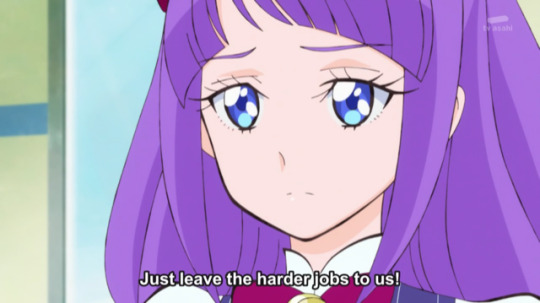
Y’know, at first, I thought Madoka empathizing with Lala’s discomfort was based on their similar upbringings.
Despite how close Lala and Hikaru are with each other, it’s Lala and Madoka who have the most in common out of all the other members of their team and I’ve been waiting for the writers to touch on that for some time now.
From birth or early childhood at the very least, everything was already decided for them. What they will be when they grow up, what their routines will be every single day, what expectations they’re supposed to fulfill, etc.
It’s a suffocating position that doesn’t leave a lot of room for argument and what shaped these two girls into having very detrimental perfectionist outlooks before that changed after meeting Hikaru and becoming Precure.
And now that Lala finds herself under stucky circumstances with her family, unable to enjoy the same openness with them as she does with her friends, I thought Madoka was going to try to encourage Lala not to let that get to her. She’s going through the same thing with her own father, after all, so if anyone can tell Lala’s going through a hard time, it’d be Madoka.


But turns out, that’s not quite the case here as the issue lies with them keeping their Precure identities and duties secret from their families instead.
Which is fine because at least Lala still has someone who can understand her on that.
Anyways, it’s a problem because being the upstanding, honest and serious types they are (majimeko) and both coming from families with high reputations, it’s really difficult for Lala and Madoka to not tell the people who are important to them about another part of their lives that is very important to them.
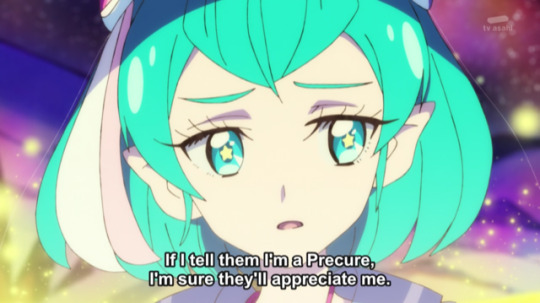
For Madoka, she feels that she’s betraying her father by hiding the fact that her friends, the very first and truest friends she’s ever made, are either aliens or helping the aliens avoid being caught.
For Lala, she’s torn between her duties as a Saamanian and wanting the acknowledgement of her family and community against the desire the protect her friends from the consequences of acting on the former.
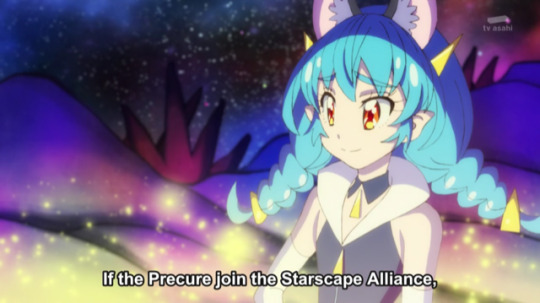
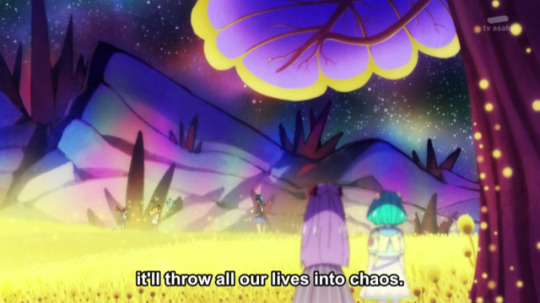
And they are right when they suspect things would probably be worst off if they were to reveal that they are Precure.
Sure, they can probably expect to receive some more substantial support from the officials of their home planet (more from the Starscape Alliance than Earth’s government, sorry Madoka)...but at what cost?
The Star team can operate and travel smoothly throughout space precisely because nobody else is aware of who they really are. If they reveal their identities, there’s no doubt they will be targeted to be controlled.
Because sadly and not to get too political or anything, that’s just what governments do. They have to control the situation, they have to think about the interests of their own countries and more often than not, they extremely suck at it and turn everything into a huge mess (and this is just massively simplifying the general for length).
If they let other people get involved, the team’s balance and even their friendship will likely absolutely be affected and strained because no way will the universe at large care about a bunch of girls getting along as much as they do about using them for its own needs.
Which I’ll get more into on Point #3 below.
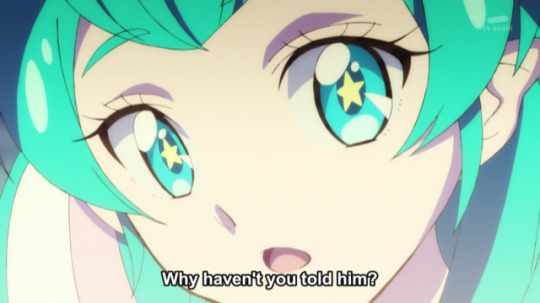
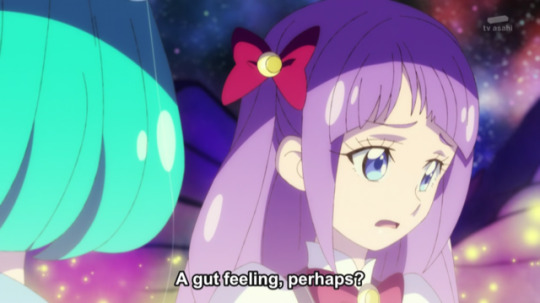
But for certain, that’s one of the reasons why Lala and Madoka are unable to tell their families about being Precure.
Yes, it makes them very uncomfortable to keep this huge secret...a secret.
But at the same time, it feels even more wrong to expose it because once that happens, nothing will be the same. Nothing can stay the same.
Even if they avoid all the worse case scenarios, the ones who will definitely suffer the most will still be the girls.
Perhaps that sounds selfish because they’re putting their friends above everything else but it’s not like the Star team isn’t also doing their best to keep the villains at bay while trying to save the universe at the same time. And they’re already doing an exceptional job without anyone breathing down their necks about it.
*cough* Sorry, getting off track a bit.
Anyways, the point is, they’re following their instincts this time which is a BIG deal for people like Lala and Madoka who have tendency to lean more towards logic.
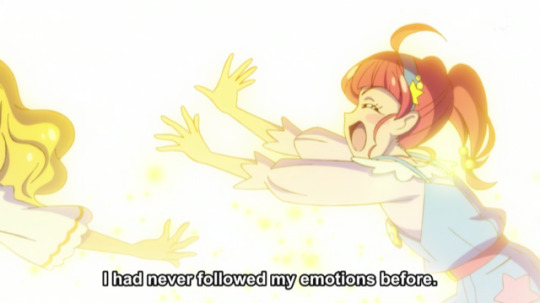
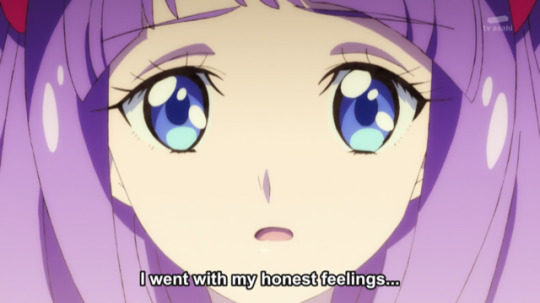
After meeting Hikaru, after letting Hikaru teach them about valuable things they didn’t know before, both Lala and Madoka learned that there is much more to the world than the structures built around them.
Sometimes, the right answer doesn’t lie in the data or the rules, cold and fair in judgement.
Sometimes, simply trusting what you feel is just more correct.
Nobody ever said doing the right thing will be easy (in fact, many times, it never is) but the heart can never lie to you after all. And it’s even more dangerous to ignore it and live through the regrets afterwards.
So which would you choose?
Going with what you feel and doing everything you can to get the best outcome? Or choosing the opposite, knowing that doing so, the best outcome becomes more impossible to achieve and you can only hope for the best of the worse?
Eh..my phrasing isn’t very good but you get what I mean, right?


Anyways, it’s just very meaningful for Madoka to be the one to say these words to Lala.
I wouldn’t say she and Lala have completed their personal journeys yet (we still have like 20 more episodes to go after all) but I do believe that this particular moment marks a very significant point in their arcs.
Having been exposed to more of the world out there beyond their own, they would never go back to being the same Lala and Madoka from the beginning.
They are still unsure about whether their choices will lead them to what they’re looking for but they both know there’s no point in looking back. They can only move forward, trusting in what they feel as right.
Which it will be and not just because this is Precure but because it will leave a very bad taste in my mouth if I wrote all that and the right doesn’t end up prevailing. :P
3) The next step...

I’ll give you a straight up “NOPE!” to that, Pops!
Apologies for letting some of my RL views seep into this post (though can you blame me when it’s been disaster after disaster out there?) but I’m positive that “joining” the Starscape Alliance (their terms, not Precure’s), no matter how well-intentioned they are, will hurt the Star team more than benefit them.
Again, cuz it will allow busybodies to unnecessarily butt into their affairs and make things harder for the girls than they already are.
Moreover...

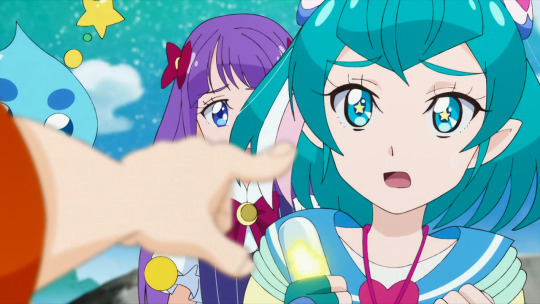
This is just Lala’s boss being an incompetent ass-for-brains idiot but if the Starscape Alliance is anything like him or even thinks remotely like him, then the Star team coming under their control spells doom for all.
Seriously, this is another level of messed up stupid. They just got terrorized by a flamboyant tengu woman and the person he accuses of trying to steal the Princess pen is Lala?! Even though the wrecked video footage is NOT enough sufficient evidence to point her as an accomplice to Tenjou? Even though Lala’s safely holding onto the pen in the aftermath, is noticeably NOT running away with it and showing concern for her boss?
WHAT THE SERIOUS FUCKING FUCK?!?!
D:<
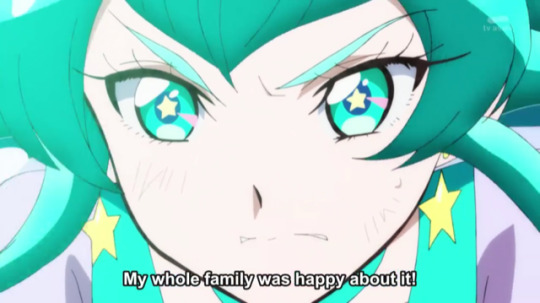
That said, I hope that in midst of all the chaos of next week’s episode, Lala’s family will at least refuse to believe Lala is a thief and try to find a way to talk to her to know what’s really going on.
Because if they can’t even do that and join the chase to jail their own daughter, then I have another concern to worry about and will immediately fly to Saaman, lay waste to it, take Lala home with me and file to adopt her as my own child (don’t laugh).
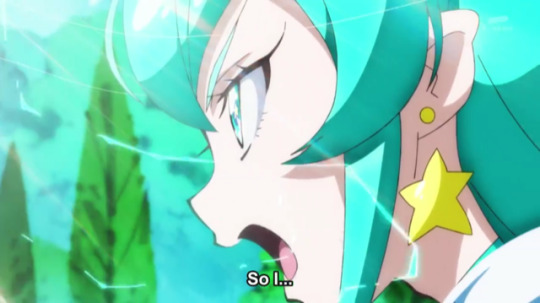

But seeing how Lala fought so hard, despite her awkward relationship with her family, to make sure Lolo’s efforts weren’t for nothing, I’m sure it’ll be alright.
Having both her parents and Lolo come to understand Lala would be ideal...but if not, then either one or the other. I’m banking on Lolo atm since he’s her twin but he can be the type who chooses the system over his own kin, too, so...
The screentime we were given just wasn’t enough for me to grasp where each of Lala’s family members stand on their respective relations with her so I can only hope for the best. :/
Ooo, and also, Cancer Star Princess gets revived next week! Yay~! :D
63 notes
·
View notes
Link
After a while, the true-life horror stories women tell about their struggles to get reproductive health care start to bleed together. They almost always feature some variation on the same character: the doctor who waves a hand and says, “You’ll be fine,” or “That’s just in your head,” or “Take a Tylenol.” They follow an ominous three-act structure, in which a woman expresses concern about a sexual or reproductive issue to a doctor; the doctor demurs; later, after either an obstacle course of doctor visits or a nightmare scenario coming to life, a physician at last acknowledges her pain was real and present the whole time. Sometimes there’s a quietly gloomy boyfriend or husband in a secondary-character role, frustrated by the strain his partner’s health issue is putting on their intimacy.
That many women have stories of medical practitioners dismissing, misdiagnosing, or cluelessly shrugging at their pain is, unfortunately, nothing new. Research cited in the Journal of Law, Medicine & Ethics in 2001, for example, indicated that women get prescribed less pain medication than men after identical procedures (controlling for body size), are less likely to be admitted to hospitals and receive stress tests when they complain of chest pain, and are significantly more likely than men to be “undertreated” for pain by doctors. And there’s a multi-million dollar industry of questionable alternative health remedies that was arguably built at least in part on a history of doctors being dismissive toward women’s bodily health.
But in 2018, these stories of neglect and unhelpfulness within women’s health care, especially women’s sexual and reproductive health care, are bubbling up to the surface—being documented, circulated, and acknowledged by public discourse—in curious abundance.
It started early in the year. In January, a widely cited Vogue cover story on the tennis great Serena Williams, who gave birth to a daughter in September of 2017, told the harrowing tale of how Williams had to urgently insist to the hospital staff in her recovery room that what she was experiencing after her C-section was a pulmonary embolism in order to get the treatment she needed to stay alive. “The nurse thought her pain medicine might be making her confused,” the story reads. A month later, Vogue published an essay by the Girlscreator Lena Dunham on her choice to have a hysterectomy at age 31 to end her struggle with what she understood to be endometriosis. “I had to work so hard to have my pain acknowledged,” she writes. “And while I’ve been battling endometriosis for a decade and this will be my ninth surgical procedure, no doctor has ever confirmed this for me.” After her uterus is removed and she wakes up in a recovery room, she writes, the doctors are eager to tell her she was right: her uterus is “worse than anyone could have imagined.”
Then, in April, The New York Times published Linda Villarosa’s revealing reporton the dangerous endeavor of being black and pregnant in America, a phenomenon partly attributed to medical practitioners’ “dismissal of legitimate concerns and symptoms.” The story’s primary character, 23-year-old New Orleans mother of two, Simone Landrum, recalls being told by a doctor to calm down and take Tylenol when she complained of headaches during a particularly exhausting pregnancy; those headaches were later found to be caused by pre-eclampsia, a pregnancy complication that causes high blood pressure and can result in the placenta separating from the uterus before the baby is born. This happened to Landrum, and her pregnancy ended in a stillbirth.
The stories kept coming. Netflix’s The Bleeding Edge, a documentary released last month, is primarily about the poor testing of many medical devices on the market, but it nonetheless also functions as an indictment of carelessness toward women’s health at the regulatory-body level. Three of the four primary narratives are about medical devices hastily approved by the FDA and marketed to women as safe, easy solutions for fertility- and childbirth-related issues. One prominently featured woman whose medical device—the birth-control implant Essure—lands her in the hospital so many times she loses her job, her home, and her kids over the course of the documentary, recalls being told by a doctor that her abnormally heavy, persistent vaginal bleeding after its insertion is “because she’s Latina” and that her problems are all in her head.
The new KCRW podcast Bodies, a series about medical mysteries in women’s health that launched in July, kicked off its run with the story of a woman in her twenties who experiences deep, burning pain during sex and is initially told by a doctor that nothing’s wrong, lots of women have pain during sex, and that she should just wait and it’ll probably go away. After getting a referral for a specialist from a friend who visited 20 doctors over the course of seven years before getting a diagnosis, she’s diagnosed with and successfully treated for a type of vulvodynia—which the American Journal of Obstetrics and Gynecologydescribes as “common” (though “rarely diagnosed”).
Sasha Ottey calls this phenomenon “health-care gaslighting.” Ottey founded the Atlanta-based nonprofit PCOS Challenge: The National Polycystic Ovary Syndrome Association in 2009 to raise awareness of PCOS, a hormonal disorder affecting the ovaries that’s often linked to infertility, diabetes, and pelvic pain. Despite the fact that PCOS was first identified and researched in 1935 and the CDC has estimated it affects some 6 to 12 percent of adult women in the United States, many doctors still don’t recognize the symptoms. Women with PCOS and similar conditions like endometriosis and uterine fibroids, Ottey says, “have been told to suffer in silence.” Additionally, because PCOS often causes obesity or weight problems, many women with PCOS experience not just sexism but what Ottey calls “weight bias” in the health-care system. “Many women and young girls are told, ‘Oh, it's all in your head. Just eat less and exercise more,’” says Ottey, who herself recalls being initially instructed by an endocrinologist to lose weight and come back in six months. “People who are following an eating plan and present their diaries to their physicians or nutritionists will be told, ‘You left something off. You're lying. You're not doing enough.’”
Ottey, who spearheaded the PCOS Challenge’s first-ever day of advocacy on Capitol Hill in May, has noted the recent shift in how—and where—women talk about their struggles getting the sexual and reproductive health care they need. “We're at a critical juncture in women's health, where women are now feeling more empowered to speak up. Because frankly, we're frustrated,” she says. “We're frustrated with the type of care that we've gotten. We're frustrated that it sometimes takes someone decades to get a diagnosis. It's been a year, or a few years, of being empowered and emboldened."
Katherine Sherif, an internist at Jefferson University Hospital in Philadelphia and the director of the hospital’s women’s primary care unit, says she hears “day in and day out” from patients “about how they are not listened to [by other doctors], how they’re blown off, how a clue was missed.” Sherif believes most of the minimization of women’s health concerns is “unconscious” on the part of both male and female doctors, but blames general societal sexism for the gaps in women’s sexual and reproductive health care. Men with sexual and reproductive dysfunction have to fight for the care they need sometimes too, she points out, but “to a lesser extent” from what she’s seen.
In her 23 years practicing medicine, Sherif has received a lot of thank-you notes from women she’s treated—and “they don’t say ‘Thank you for saving my life’ or ‘Thank you for that great diagnosis,’” she says. “They say, ‘Thank you for listening to me.’ Or ‘I know we couldn’t get to the bottom of it, but thank you for being there.’” So Sherif sees a common theme in the recent flurry of high-profile expressions of disappointment in women’s reproductive health care, feminist protests against President Donald Trump, and the #MeToo movement: All three, she says, result from women feeling that their complaints, concerns, and objections aren’t being listened to.
“Perhaps it parallels what’s changing in our society,” Sherif says. “When we shine a light in those dirty, dark corners, I think it may give us courage to shed light on other things.”
Ottey, meanwhile, believes women’s increasing candor about their health- and health care-related frustrations can be traced back to the advent of social media. Ottey describes her own struggle to finally get a diagnosis and a treatment plan for PCOS in 2008 as one that made her feel “absolutely alone,” but in the years since, she says, she’s seen women with similar conditions and complaints find and support each other on platforms like Facebook and Twitter. “Women see other women, and other girls, speaking up,” she says.
Ottey’s social-media strength-in-numbers theory is borne out in The Bleeding Edge, too: Women whose health deteriorated after getting the Essure birth-control device implanted eventually created an advocacy campaign after finding each other through a Facebook group launched in 2011. Thirty-five thousand women had joined by the time The Bleeding Edge was filmed.
Angie Firmalino, the Facebook group’s founder, remembers being surprised at how many women quickly joined the group, despite it being a project she’d started just so she could warn her female friends about the device. “We became a support group for each other,” Firmalino says, as a montage of selfie videos women have posted to the group page play onscreen. “The day I was implanted, I left the hospital and I was in pain,” says one woman. “They told me to take some ibuprofen and it’ll get better,” says another.
When Firmalino researched the process by which Essure was approved for sale and implantation, she found the FDA hearings had been videotaped, but the video company that owned the tapes would only release them to her for several hundred dollars. So she posted on the Facebook group asking for donations to buy the video—clips of which are repurposed in the documentary and account for its most chilling moments. They raised $900 in 15 minutes.
#women's health#SO SO SO IMPORTANT#PCOS#endometriosis#maternity care#contraceptives#pain#being ignored
6 notes
·
View notes
Photo

Mira
8/19/17
Photo: Gary and Soren Smith Center, Ohlone College
Mira is warm, sweet, and very kind. Her very presence is soothing and keeps the nightmares at bay. Everyone loves her and her big heart. She is the kind of person who made sure that no one is left behind, always nursed and cared for every single soul.
Raised by a loving yet conformative family, Mira was taught to be “proper”, adhere to tradition, and follow orders. Her family consisted of a mom, dad, and two brothers (one younger, the other older). For the most part, they all got along pretty well… but sometimes occasional tension would arise. You see, her family has a name, a reputation to uphold. Duties must be completed with no delay and Mira’s calculative parents are wealthy and powerful, so there is an image that must be maintained. Society, the world, they need a leader. A damn well respectable one. There can be no trouble, no secrets or scandals… otherwise they would lose everything they have built in a blink of an eye.
In a household, particularly in an Asian one, being professional and reputable is a no brainer. Compared to other parents, I feel that Asian parents want their children to have a strong backbone or structure at an early age. This would enable them to have a stable future. Of course, there is nothing wrong with that. In fact, having structure at an early age prepares you for future obstacles. You have more opportunities to take advantage of, develop strong networking skills, and are better mentally prepared for the future. Although implementing these things from an early age is crucial, doing so can also make them forget what it is like to enjoy life. To enjoy the smallest moments. To smile, laugh, and cry.
To go on countless adventures and make timeless memories.
This is a small excerpt from Mira’s story. Insight into her life.
So with her parents’ support, Mira decided to venture out beyond the walls of her home and explore the outside world. She came here to America from her hometown in hope of pursuing a better education and independence. She wanted to see how people interacted with each other and how their lifestyle contrasted with hers. She wanted to see and experience things in person; to go on adventures and feel the thrill.
Mira had ventured through various places of the town, and stumbled upon a marketplace selling a variety of goods. There were fresh produce, odd trinkets, homemade crafts, and much more. Mira observed many things. Some people were sitting at small shops, drinking their cup of tea or coffee whilst reading the local paper. Others were calling out to the public to advertise their products. At a park not afar, children were running about, smiling and laughing while playing tag. Mira smiled at everything and everyone. The genuinity in her smile showed how much she enjoyed the warmth and liveliness of the town; how much she appreciated the little things.
Then a particular person caught her attention.
He was in his mid thirties, had brown eyes, and lean, tall, and very much handsome. Mira took note of his broad shoulders and the way that he walked, but she also noticed how “tired” he was. He seemed to be working day and night with little or no break at all. Beneath his eyes, there were bags and the expression on his face looked as if he was empty and lost. The man wasn’t like the rest of the crowd, he was an intriguing and contrasted with the happy atmosphere of the town. The man made his way to the park and sat down a bench to take a breather. He tilted his head back and let out a long sigh as he gazed upon the blue sky. Mira was fascinated by this guy. She couldn’t help but feel a certain pull begging her towards him. She couldn’t help but wanting to get to know him.
Then slowly and unknowingly, she found herself making her way towards him. But upon realization, she stopped.
Why did you stop when you did?
Her reply was: “I was raised in a stereotypical environment where women were expected to obey and take on the role as a housewife. Of course, that is how most strict, conforming households are, but in my case, I come from a place where devotion comes before everything else. Devotion to family, religion, and upholding the family reputation. I come from a place where it is hard to make yourself heard, known, and acknowledged. Raised in a household where hopes and dreams are bleak. Where freedom is impossible to even think about. I was hesitant because I know these things can’t possibly come true for me.
Back in my hometown I lived with two other siblings. We were all expected to do our part. My parents, parents’ friends, and boss had high hopes for us (They still do). As a result, I have this huge weight on my shoulders. It creates emotional baggage, but physical as well. I usually from eight in the morning to eight at night, no extra pay or compensation added. On top of that the commute to work is troublesome. And at times, when I feel like I am not enough, hopelessness find its way in and I am trapped in a mental prison. Suffocated with sorrow and despair.
Even in my dating life, my familial and societal expectations have a say in it. My parents, especially my mom, believes that a perfect suitor would be someone from my temple. She goes on saying that there are many young, healthy and wealthy looking men. Yes, I understand her point of view and concern, but I made it clear that if I ever fall in love, it would be with someone with scars riddled all over; someone who is not perfect. Someone warm and genuine. Because you see, there is beauty hidden among the scars. There is beauty in the story that lies underneath in all the wounds that has been inflicted.
Additionally, I’ve also dated guys before who had little or no interest in solid relationship. A few just came for the thrills and wanted have some fun. And then there were some that really tried to push my buttons. Let’s just say that those guys were persistent on getting some ‘bed exercise’ -she chuckles-. But really, I want something more than just a physical connection. Lust is an important factor that jump starts a relationship, the foundation of it. It is emotional connection that represents the missing piece of the puzzle.
But it seems for me, finding someone whom I can call ‘home’ will never happen. Loyalty is rare and people tend to choose good time over a lifetime commitment because it is less hassle. I feel tired; exhausted to the point of hollowness.
( This is a story of my friend. An ordinary person with a heartbreaking story. Her name is Mira. I met her during my first year at college. At first glance, she may seem quiet, frail, and isolated. But the truth is once you get to know her, she’s the sweetest and wisest person you’ll ever meet. However, with most people, there are scars and stories that go beyond the ocean’s deepness. From the outside, things may seem alright, but on the inside, there lies a different story.
It is a story that I have seen one too many times.
But despite such obstacles, that shouldn’t stop you from pursuing happiness and doing what you love. I get the logical standpoint that your parents offer, but it ultimately comes down to you. It’s your decision, your life, your story. Yes we need logic and guidance in our lives, but we also need support in other aspects as well. And eventually, we are going to transition into independence. We can’t depend on our parents forever and vice versa. Above all, we can’t be tied down.
I’m not saying that parents are suffocating. I’m not saying that I’m not grateful for their advice. What I’m trying to say is that we need to be able to go out on our own and explore. To be independent and experience many things. To meet new people and make new friends. To be given a chance.)
1 note
·
View note
Text
TEACHING MOMENT FOR ALLIES: PLEASE UNDERSTAND THE DIFFERENCE BETWEEN "TERF-Y" AND "TRANSMISOGYNIST"
(TL;DR: "Transmisogyny" is the way in which trans women experience the intersection of transphobia and misogyny, inextricable from one another and mutually constitutive, and also describes the systems of social power and violence that produce this experience; "TERFism" (trans-exclusionary radical feminism or sometimes trans exterminationist radical feminism) is a particular ideology and movement that is primarily structured by its transmisogyny, but which is definitely not the only manifestation thereof. The two are not interchangeable, and learning to recognize TERFism insofar as it is distinct from other kinds of transmisogyny will make you a better ally/accomplice to trans women. Scroll down for a mini field guide.)
I was at this conference over the weekend, and at one point I was talking with someone else about the sessions. One of them was lead by a Sister of Perpetual Indulgence ("drag nuns"; one of the surviving elements of older-school spectacle theater LGBTQ+ activism) and the person I was talking to expressed interest in the session, but (quote as best I can recall) "I get uncomfortable with drag queens because some of them are pretty TERF-y".
I think what this person was getting at was that drag queens (and sometimes "drag culture" more broadly, especially where it has become more commodified and whiter) often enact misogyny (and transmisogyny especially--plus racism, ableism, etc. etc. in other ways).
I appreciate this acknowledgment. I have a really troubled relationship with drag queens and drag generally because of the transmisogyny I've experienced in that context. BUT--and I understand that this might seem pedantic, but please hear me out--but, the word needed in this situation is not "TERF-y", it's "transmisogynist" (or "transphobic", but TBH I think the gender specificity here is important).
I say this because TERFism is a particular ideology with a particular history defined largely by its rejection of and hatred toward trans women--but that history and that ideology are very, very rarely the things that make drag transmisogynist. Basically, all TERFs are transmisogynist, but not all transmisogynists are TERFs.
So, for example--TERFs often argue that trans women are "appropriating womanhood" because we did not experience (cis) girlhood, which is, by their argument, a necessary prerequisite to put one in the social category of woman. They sometimes describe our identities and presentations as "womanface" (akin to blackface) because of this. It probably doesn't surprise you that this analysis does not favor drag queens either (although perhaps ironically, I think it's actually a reasonable analysis of cases where drag queens are mocking femininity or playing into misogynist stereotypes for humor value--though to be clear, "womanface" is a troubled concept given the history here is not in any meaningful way similar to blackface).
On the contrary, in my experience, transmisogyny coming from drag communities is rarely based on principle or any real gender analysis. It's mostly a reflection of general societal transmisogyny, with the same tropes (using "man in a dress" as a punchline, treating "passing" trans women as deceptive, rampant use of slurs like "shemale" and "tranny", etc.), distinguished only in that participants often feel a stronger sense of entitlement to those words, tropes, and joke. TERFs may use some of the same ideas (the "deceptive/predatory tranny" is a big archetype for them wrt lesbian trans women) but the drag community's usage does not generally add up to anything bigger, other than one more voice in the background noise of societal transmisogyny.
Now, my understanding of this was hard-won through decades of life as a trans woman, as well as no small amount of formal education on the subject. Obviously, I don't expect others to go through that, so here's a brief field guide to spotting TERFs (note: if you want counterarguments or ways to address some of these views, feel free to message me, but it'd take FOREVER to address every single one here)...
.
.
.
.
-A FIELD GUIDE TO IDENTIFYING TERFs-
-SOCIALIZATION DISCOURSE-
TERFs typically argue that trans women are "socialized male", i.e. that we were raised as boys/men and that we internalized messages associated with that (entitlement to women's bodies and sexual aggressiveness, dominance in conversations, lack of stigmatization of our bodies).
This also pops up in criticisms of trans women's behavior, where if we are loud, angry, or assertive, those behaviors are read as "mannish" or "masculine" and as such as evidence of our "male socialization", because women and girls are often taught not to express themselves in those ways and are punished for doing so.
This is pretty specific to TERFism--general transmisogynists rarely analyze quite this deeply.
-SEX ESSENTIALISM-
TERFs typically argue that women's oppression is located specifically in (cis) female bodies. They'll often argue that gender isn't real (or e.g. that "gender identity" is just internalized sex/gender role stereotypes), but sex is, and that because trans women are not (cis) female that we do not experience misogyny (even if we "pass"). Sometimes this argument takes on a spiritual or mystical angle, saying that trans women have "male energy" or auras. This is often also applied to trans men, who they generally treat as women "lead astray" by trans politics or the allure of male privilege.
The particular analysis above--connecting misogyny specifically to cis female embodiment--is generally connected to TERF thought (but not always! I think, for example, some of the pushback to trans women's frustration about the whole pussy hat thing came from a not-intentionally-TERFy inability of some cis feminists to imagine or connect how trans women experience violence as women, and a strong sense that regulation of and violence against their (specifically cis) female bodies was a necessary element of experiencing "womanhood"), but sex essentialism and biological essentialism itself shows up all over. Liberal feminist thought, for example, often uncritically reproduces the sex/gender distinction, constructing trans women as "male women" in the process, and "really a man!" is like basic Geraldo-level shit.
-PENIS STUFF-
One other manifestation of sex essentialism is hyperfocus on genitals--TERFs sometimes treat trans women's penises as basically purpose-built tools for raping (cis) women (or, more specifically, they argue that all penises are rape machines and never miss a chance to remind trans women that our dicks are weapons, too). Especially when they focus specifically on trans women's genitals (and not cis men's), they overlap a lot here with far right Christo-Fascist types (see: Women's Liberation Front filing a joint amicus brief with Focus on the Family in the Gavin Grimm case), so hyperfocus on our genitals is transmisogynistic, but not necessarily TERFism. This trope also gets played for comedy (Ace Ventura, The Hangover 2, Family Guy) or drama (The Crying Game, Silence of the Lambs) all the time.
-MALE PRIVILEGE-
Between the socialization and embodiment stuff above, TERFs almost always argue that trans women had and benefited from male privilege before coming out or transitioning, and will often argue that we continue having it even after we've done so. This is the most common argument for the existence of "women's spaces" that exclude trans women (but often include trans men!)--that they are for "people who have never experienced male privilege", or sometimes they just overtly state "this space is only for people assigned female at birth". These two, especially when treated as though they are synonymous with "women", is explicitly TERFy.
Like socialization, this is typically an argument used by TERFs because general transmisogynists just aren't that engaged in feminist analysis and aren't thinking about the operation of male privilege in their day to day lives.
-SLURS, PRONOUNS, AND LANGUAGE-
In my experience, TERFs are less likely to use slurs ("shemale", "tranny", etc.) or derogatory terms ("trap", "he-she", etc.) than general transmisogynists, in part because they know optics matter, and slurs will typically push leftist people away. That doesn't mean they never do it, or that they necessarily care about leftists (see above, WoLF cozying up with FotF), but they do present themselves as "radicals" and cultivate that image with a veneer of respectability. Somebody using slurs really openly PROBABLY isn't a TERF, but might be.
What they will do, however, is aggressively misgender trans people, especially trans women. Frequently they will refer to us as "males" to rhetorically class us alongside cis men (or sometimes just use "men" with an understanding that they're including us), and will use he/him/his pronouns when talking about us. Other times--especially in spaces where they are cultivating that veneer of Legit Respectable Leftism, they will either use no pronouns for us at all, or only use "they". Some of them, in some spaces, will use correct pronouns, especially for trans women who support their politics and ideology. Obviously, though, misgendering happens all the time, and just misgendering a person is obviously transphobic, but not necessarily TERFy.
For obvious reasons, few TERFs identify with the label "TERF", and may argue that "TERF" is a slur. They may identify themselves simply as "radical feminists", or use other euphemisms ("gender critical" is a very common one) that distance themselves from the reputation that has been attached to TERFism (and to some extent, radical feminism more generally). For the most part, only TERFs think TERF is a slur. There are, however, trans-inclusive radical feminists that are determined to remediate and reclaim the "radical feminist" label, even though it fell out of favor for a while, so keep that in mind.
-OTHER RANDOM NOTES THAT DON'T FIT ANYWHERE ELSE-
Sometimes I use TWERF instead of TERF--it changes it to Trans Woman-Exclusionary/Exterminatory Radical Feminism". I do this because historically TERFs have primarily targeted trans women and CAMAB NB folks for violence in ways that they have not targeted trans men or CAFAB folks generally. I think this is an important history to remember, but I use TERF throughout this piece because it's more familiar to people.
As above, Trans-Inclusive Radical Feminism is a thing that does exist. I know radical feminists who oppose TERFs (in fact, the term "TERF" originated with radical feminists trying to push transphobes/transmisogynists out of their orgs and spaces). I considered myself a radical feminist for quite a while. That doesn't mean you can never use "radfem" pejoratively (especially, I would never tell other CAMAB women how to talk about their experiences of violence) but you should be careful about it, because IMO that demonization of radical feminism is how we ended up in a liberal feminist pit, just trying to tread water. Part of how TERFs recruit is that they're a way to escape this hell of Lean In corporate apologism and must-defend-Kellyanne-Conway liberal bullshit. Part of keeping their ranks from swelling as people realize how late-stage capitalism has turned mainstream feminism into a marketing exercise is to open up other options for them--womanism, transfeminism, and yes, TIRFism.
As I said way back, TERFism is structured around its transmisogyny. It doesn't offer a coherent gender analysis that even begins to reflect the reality of trans women's experiences because as time wears on and it continues to solidify as a sect of feminism, it more and more has to structure itself around societal transmisogyny for support. The problem is that societal transmisogyny is a VERY steady, reliable base on which to build your shit, because society fucking hates trans women and has for centuries, even millennia. So even though TERFism is essentially ideologically incoherent, there is intense social reward for participating in transmisogyny, no matter how you come by it. Remember that if you're thinking of trying to argue a TERF into reasonableness: for them, there is a reward above and beyond intellectual satisfaction to be gained by their bigotry: the creation of a trans woman underclass ripe for exploitation (especially sexual exploitation) and who attract a great deal of men's sexual and relational violence in society. In other words, you're not likely to succeed.
-CONCLUSION-
Obviously not all TERFs will conform to what I've said above. Sometimes people will say or do TERFy things without being TERFs (I'd argue that Chimamanda Ngozi Adichie's comments last month were TERF-y in their emphasis of socialization, but that she herself is not a TERF). But the important take away here is that transmisogyny is different from TERFism, and it exists in the bedrock of our society.
Being able to distinguish TERFs from other kinds of transmisogynists is an important tactical ability, if you want to work alongside trans women to dismantle the systems that oppress us. Just as Mike Pence's misogyny is different from GamerGate misogyny, and just as both require unique approaches even if they are obviously aspects of the same struggle, transmisogyny is a many-headed beast, some more difficult to tackle than others. TERFs, I can promise you, are a hard one to tackle. Casting all transmisogyny as TERFism makes for both a pessimistic vision (it's gonna be hard to root out) and an overly optimistic one (in reality, transmisogyny looks like many different things, and no one strategy will work for all of them). Listening to trans women and being familiar with our history and movements will make you much more effective working alongside us.
#transmisogyny#transphobia#trans#trans womanhood#lgbt#lgbtq#ally#allyship#ppl on facebook seemed to find it helpful
62 notes
·
View notes
Text
The Doctor Doesn’t Listen to Her. But the Media Is Starting To.
https://healthandfitnessrecipes.com/?p=8912
After a while, the true-life horror stories women tell about their struggles to get reproductive health care start to bleed together. They almost always feature some variation on the same character: the doctor who waves a hand and says, “You’ll be fine,” or “That’s just in your head,” or “Take a Tylenol.” They follow an ominous three-act structure, in which a woman expresses concern about a sexual or reproductive issue to a doctor; the doctor demurs; later, after either an obstacle course of doctor visits or a nightmare scenario coming to life, a physician at last acknowledges her pain was real and present the whole time. Sometimes there’s a quietly gloomy boyfriend or husband in a secondary-character role, frustrated by the strain his partner’s health issue is putting on their intimacy.
That many women have stories of medical practitioners dismissing, misdiagnosing, or cluelessly shrugging at their pain is, unfortunately, nothing new. Research cited in the Journal of Law, Medicine & Ethics in 2001, for example, indicated that women get prescribed less pain medication than men after identical procedures (controlling for body size), are less likely to be admitted to hospitals and receive stress tests when they complain of chest pain, and are significantly more likely than men to be “undertreated” for pain by doctors. And there’s a multi-million dollar industry of questionable alternative health remedies that was arguably built at least in part on a history of doctors being dismissive toward women’s bodily health.
How doctors take women's pain less seriously
But in 2018, these stories of neglect and unhelpfulness within women’s health care, especially women’s sexual and reproductive health care, are bubbling up to the surface—being documented, circulated, and acknowledged by public discourse—in curious abundance.
It started early in the year. In January, a widely cited Vogue cover story on the tennis great Serena Williams, who gave birth to a daughter in September of 2017, told the harrowing tale of how Williams had to urgently insist to the hospital staff in her recovery room that what she was experiencing after her C-section was a pulmonary embolism in order to get the treatment she needed to stay alive. “The nurse thought her pain medicine might be making her confused,” the story reads. A month later, Vogue published an essay by the Girls creator Lena Dunham on her choice to have a hysterectomy at age 31 to end her struggle with what she understood to be endometriosis. “I had to work so hard to have my pain acknowledged,” she writes. “And while I’ve been battling endometriosis for a decade and this will be my ninth surgical procedure, no doctor has ever confirmed this for me.” After her uterus is removed and she wakes up in a recovery room, she writes, the doctors are eager to tell her she was right: her uterus is “worse than anyone could have imagined.” Then, in April, The New York Times published Linda Villarosa’s revealing report on the dangerous endeavor of being black and pregnant in America, a phenomenon partly attributed to medical practitioners’ “dismissal of legitimate concerns and symptoms.” The story’s primary character, 23-year-old New Orleans mother of two Simone Landrum, recalls being told by a doctor to calm down and take Tylenol when she complained of headaches during a particularly exhausting pregnancy; those headaches were later found to be caused by pre-eclampsia, a pregnancy complication that causes high blood pressure and can result in the placenta separating from the uterus before the baby is born. This happened to Landrum, and her pregnancy ended in a stillbirth.
The stories kept coming. Netflix’s The Bleeding Edge, a documentary released last month, is primarily about the poor testing of many medical devices on the market, but it nonetheless also functions as an indictment of carelessness toward women’s health at the regulatory-body level. Three of the four primary narratives are about medical devices hastily approved by the FDA and marketed to women as safe, easy solutions for fertility- and childbirth-related issues. One prominently featured woman whose medical device—the birth-control implant Essure—lands her in the hospital so many times she loses her job, her home, and her kids over the course of the documentary, recalls being told by a doctor that her abnormally heavy, persistent vaginal bleeding after its insertion is “because she’s Latina” and that her problems are all in her head.
The new KCRW podcast Bodies, a series about medical mysteries in women’s health that launched in July, kicked off its run with the story of a woman in her twenties who experiences deep, burning pain during sex and is initially told by a doctor that nothing’s wrong, lots of women have pain during sex, and that she should just wait and it’ll probably go away. After getting a referral for a specialist from a friend who visited 20 doctors over the course of seven years before getting a diagnosis, she’s diagnosed with and successfully treated for a type of vulvodynia—which the American Journal of Obstetrics and Gynecology describes as “common” (though “rarely diagnosed”).
Sasha Ottey calls this phenomenon “health-care gaslighting.” Ottey founded the Atlanta-based nonprofit PCOS Challenge: The National Polycystic Ovary Syndrome Association in 2009 to raise awareness of PCOS, a hormonal disorder affecting the ovaries that’s often linked to infertility, diabetes, and pelvic pain. Despite the fact that PCOS was first identified and researched in 1935 and the CDC has estimated it affects some 6 to 12 percent of adult women in the United States, many doctors still don’t recognize the symptoms. Women with PCOS and similar conditions like endometriosis and uterine fibroids, Ottey says, “have been told to suffer in silence.” Additionally, because PCOS often causes obesity or weight problems, many women with PCOS experience not just sexism but what Ottey calls “weight bias” in the health-care system. “Many women and young girls are told, ‘Oh, it's all in your head. Just eat less and exercise more,’” says Ottey, who herself recalls being initially instructed by an endocrinologist to lose weight and come back in six months. “People who are following an eating plan and present their diaries to their physicians or nutritionists will be told, ‘You left something off. You're lying. You're not doing enough.’”
When missed periods are a metabolic problem
Ottey, who spearheaded the PCOS Challenge’s first-ever day of advocacy on Capitol Hill in May, has noted the recent shift in how—and where—women talk about their struggles getting the sexual and reproductive health care they need. “We're at a critical juncture in women's health, where women are now feeling more empowered to speak up. Because frankly, we're frustrated,” she says. “We're frustrated with the type of care that we've gotten. We're frustrated that it sometimes takes someone decades to get a diagnosis. It's been a year, or a few years, of being empowered and emboldened."
Katherine Sherif, an internist at Jefferson University Hospital in Philadelphia and the director of the hospital’s women’s primary care unit, says she hears “day in and day out” from patients “about how they are not listened to [by other doctors], how they’re blown off, how a clue was missed.” Sherif believes most of the minimization of women’s health concerns is “unconscious” on the part of both male and female doctors, but blames general societal sexism for the gaps in women’s sexual and reproductive health care. Men with sexual and reproductive dysfunction have to fight for the care they need sometimes too, she points out, but “to a lesser extent,” from what she’s seen.
In her 23 years practicing medicine, Sherif has received a lot of thank-you notes from women she’s treated—and “they don’t say ‘Thank you for saving my life’ or ‘Thank you for that great diagnosis,’” she says. “They say, ‘Thank you for listening to me.’ Or ‘I know we couldn’t get to the bottom of it, but thank you for being there.’” So Sherif sees a common theme in the recent flurry of high-profile expressions of disappointment in women’s reproductive health care, feminist protests against President Donald Trump, and the #MeToo movement: All three, she says, result from women feeling that their complaints, concerns, and objections aren’t being listened to.
“Perhaps it parallels what’s changing in our society,” Sherif says. “When we shine a light in those dirty, dark corners, I think it may give us courage to shed light on other things.”
Ottey, meanwhile, believes women’s increasing candor about their health- and health care-related frustrations can be traced back to the advent of social media. Ottey describes her own struggle to finally get a diagnosis and a treatment plan for PCOS in 2008 as one that made her feel “absolutely alone,” but in the years since, she says, she’s seen women with similar conditions and complaints find and support each other on platforms like Facebook and Twitter. “Women see other women, and other girls, speaking up,” she says.
Ottey’s social-media strength-in-numbers theory is borne out in The Bleeding Edge, too: Women whose health deteriorated after getting the Essure birth-control device implanted eventually created an advocacy campaign after finding each other through a Facebook group launched in 2011. Thirty-five thousand women had joined by the time The Bleeding Edge was filmed.
Angie Firmalino, the Facebook group’s founder, remembers being surprised at how many women quickly joined the group, despite it being a project she’d started just so she could warn her female friends about the device. “We became a support group for each other,” Firmalino says, as a montage of selfie videos women have posted to the group page play onscreen. “The day I was implanted, I left the hospital and I was in pain,” says one woman. “They told me to take some ibuprofen and it’ll get better,” says another.
When Firmalino researched the process by which Essure was approved for sale and implantation, she found the FDA hearings had been videotaped, but the video company that owned the tapes would only release them to her for several hundred dollars. So she posted on the Facebook group asking for donations to buy the video—clips of which are repurposed in the documentary and account for its most chilling moments. They raised $900 in 15 minutes.
https://cdn.theatlantic.com/assets/media/img/mt/2018/08/Bettmann_Getty_edit/lead_960.jpg
Credits:
Original Content Source
0 notes
Text
Beyonce Photographed by Tyler Mitchell
Since the news broke that Beyonce will be the cover star for the Vogue September issue, we’ve been anticipating what the cover will look like, especially since she’s the one in charge of everything about the cover and as she told Clover Hope for the cover, you can bet she’s a super human, she’s a legend and we can’t get enough of every of her look for this cover and even her words too.
Freedom
I don’t like too much structure. I like to be free. I’m not alive unless I am creating something. I’m not happy if I’m not creating, if I’m not dreaming, if I’m not creating a dream and making it into something real. I’m not happy if I’m not improving, evolving, moving forward, inspiring, teaching, and learning.
Legacy
My mother taught me the importance not just of being seen but of seeing myself. As the mother of two girls, it’s important to me that they see themselves too—in books, films, and on runways. It’s important to me that they see themselves as CEOs, as bosses, and that they know they can write the script for their own lives—that they can speak their minds and they have no ceiling. They don’t have to be a certain type or fit into a specific category. They don’t have to be politically correct, as long as they’re authentic, respectful, compassionate, and empathetic. They can explore any religion, fall in love with any race, and love who they want to love.
I want the same things for my son. I want him to know that he can be strong and brave but that he can also be sensitive and kind. I want my son to have a high emotional IQ where he is free to be caring, truthful, and honest. It’s everything a woman wants in a man, and yet we don’t teach it to our boys.
I hope to teach my son not to fall victim to what the internet says he should be or how he should love. I want to create better representations for him so he is allowed to reach his full potential as a man, and to teach him that the real magic he possesses in the world is the power to affirm his own existence.
I’m in a place of gratitude right now.
I am accepting of who I am. I will continue to explore every inch of my soul and every part of my artistry.
I want to learn more, teach more, and live in full.
I��ve worked long and hard to be able to get to a place where I can choose to surround myself with what fulfills and inspires me.
Opening Doors
Until there is a mosaic of perspectives coming from different ethnicities behind the lens, we will continue to have a narrow approach and view of what the world actually looks like. That is why I wanted to work with this brilliant 23-year-old photographer Tyler Mitchell.
When I first started, 21 years ago, I was told that it was hard for me to get onto covers of magazines because black people did not sell. Clearly that has been proven a myth. Not only is an African American on the cover of the most important month for Vogue, this is the first ever Vogue cover shot by an African American photographer.
It’s important to me that I help open doors for younger artists. There are so many cultural and societal barriers to entry that I like to do what I can to level the playing field, to present a different point of view for people who may feel like their voices don’t matter.
Imagine if someone hadn’t given a chance to the brilliant women who came before me: Josephine Baker, Nina Simone, Eartha Kitt, Aretha Franklin, Tina Turner, Diana Ross, Whitney Houston, and the list goes on. They opened the doors for me, and I pray that I’m doing all I can to open doors for the next generation of talents.
If people in powerful positions continue to hire and cast only people who look like them, sound like them, come from the same neighborhoods they grew up in, they will never have a greater understanding of experiences different from their own. They will hire the same models, curate the same art, cast the same actors over and over again, and we will all lose. The beauty of social media is it’s completely democratic. Everyone has a say. Everyone’s voice counts, and everyone has a chance to paint the world from their own perspective.
Pregnancy & Body Acceptance
After the birth of my first child, I believed in the things society said about how my body should look. I put pressure on myself to lose all the baby weight in three months, and scheduled a small tour to assure I would do it. Looking back, that was crazy. I was still breastfeeding when I performed the Revel shows in Atlantic City in 2012. After the twins, I approached things very differently.
I was 218 pounds the day I gave birth to Rumi and Sir. I was swollen from toxemia and had been on bed rest for over a month. My health and my babies’ health were in danger, so I had an emergency C-section. We spent many weeks in the NICU. My husband was a soldier and such a strong support system for me. I am proud to have been a witness to his strength and evolution as a man, a best friend, and a father. I was in survival mode and did not grasp it all until months later. Today I have a connection to any parent who has been through such an experience. After the C-section, my core felt different. It had been major surgery. Some of your organs are shifted temporarily, and in rare cases, removed temporarily during delivery. I am not sure everyone understands that. I needed time to heal, to recover. During my recovery, I gave myself self-love and self-care, and I embraced being curvier. I accepted what my body wanted to be. After six months, I started preparing for Coachella. I became vegan temporarily, gave up coffee, alcohol, and all fruit drinks. But I was patient with myself and enjoyed my fuller curves. My kids and husband did, too.
I think it’s important for women and men to see and appreciate the beauty in their natural bodies. That’s why I stripped away the wigs and hair extensions and used little makeup for this shoot.
To this day my arms, shoulders, breasts, and thighs are fuller. I have a little mommy pouch, and I’m in no rush to get rid of it. I think it’s real. Whenever I’m ready to get a six-pack, I will go into beast zone and work my ass off until I have it. But right now, my little FUPA and I feel like we are meant to be.
Ancestry
I come from a lineage of broken male-female relationships, abuse of power, and mistrust. Only when I saw that clearly was I able to resolve those conflicts in my own relationship. Connecting to the past and knowing our history makes us both bruised and beautiful.
I researched my ancestry recently and learned that I come from a slave owner who fell in love with and married a slave. I had to process that revelation over time. I questioned what it meant and tried to put it into perspective. I now believe it’s why God blessed me with my twins. Male and female energy was able to coexist and grow in my blood for the first time. I pray that I am able to break the generational curses in my family and that my children will have less complicated lives.
My Journey
There are many shades on every journey. Nothing is black or white. I’ve been through hell and back, and I’m grateful for every scar. I have experienced betrayals and heartbreaks in many forms. I have had disappointments in business partnerships as well as personal ones, and they all left me feeling neglected, lost, and vulnerable. Through it all I have learned to laugh and cry and grow. I look at the woman I was in my 20s and I see a young lady growing into confidence but intent on pleasing everyone around her. I now feel so much more beautiful, so much sexier, so much more interesting. And so much more powerful.
Beyonce Photographed by Tyler Mitchell
Beyonce Photographed by Tyler Mitchell
Beyonce Photographed by Tyler Mitchell
Beyonce Photographed by Tyler Mitchell
Beyonce Photographed by Tyler Mitchell
Beyonce Photographed by Tyler Mitchell
Beyonce Photographed by Tyler Mitchell
Beyonce Photographed by Tyler Mitchell
Beyonce Photographed by Tyler Mitchell
Beyonce Photographed by Tyler Mitchell
Beyonce In Her Own Words; Vogue September Cover Since the news broke that Beyonce will be the cover star for the Vogue September issue, we've been anticipating what the cover will look like, especially since she's the one in charge of everything about the cover and as she told Clover Hope for the cover, you can bet she's a super human, she's a legend and we can't get enough of every of her look for this cover and even her words too.
0 notes
Text
Tribute: Justice Kennedy’s counter-clerks
Leah Litman is an assistant professor of law at UC Irvine School of Law. She clerked for Justice Anthony Kennedy during the October 2011 term.
Other justices are celebrated for hiring counter-clerks — clerks who are hired because they often disagree with a justice, not in spite of it. In Justice Anthony Kennedy’s case, all of his law clerks are his counter-clerks. There probably is not a single lawyer in the United States whose views align entirely with the justice’s, and there probably hasn’t been one for a while. And it says something good about him that he would hire someone like me, who was constitutionally incapable of telling him what he may have wanted to hear, even now.
By the time the justice interviewed me, he had certainly grown accustomed to disagreement, but maybe hadn’t grown to like it. During the interview, the justice brought up one of the rare areas of law in which he found himself in dissent and asked what I thought about the direction the Supreme Court had taken. I replied that I thought the court had gotten it right. I also couldn’t help but add that I thought the court hadn’t pressed the principle as far as I thought it should go. The justice smiled and nodded, and hired me on the spot.
Confidentiality rules make it difficult to use more than that anecdote to demonstrate just how much the justice managed to keep the conflict that always surrounded him and his work at arm’s length, perhaps to ensure it didn’t affect the person he is. And he succeeded at that and more: Justice Kennedy is as genteel and polite as his public persona suggests — he is so darn nice that his clerks like to think we are each his favorite. Even 20-plus years into his time on the court, the justice has never spoken an unkind word to any of us. He thanked us for our work on every case, and he would always share when a particular memo or draft was especially good, but never when it may have been especially bad.
It may have helped in keeping things nice that the justice managed to find agreement with both wings of the Supreme Court in major, high-visibility cases, a propensity that contributed to his being labeled as the “swing” justice. The justice didn’t care for that moniker, and after my clerkship, I understood why it is wrong. The word “swing” suggests the justice goes back and forth in his views. But the opposite is true: He has a readily apparent set of commitments to principles such as federalism and free speech, including a deep skepticism of the government’s ability to decide what speech is permitted and what speech isn’t. No one could seriously doubt the sincerity with which he holds those views, which have sometimes led him both to positions he didn’t support as a matter of policy and to decisions he was especially proud of.
It’s true the justice extensively considered his votes in cases, but he did that because he was committed to getting things right, and sometimes getting things right required him to get into the weeds. The term I clerked, the Supreme Court heard a statutory interpretation case that had fairly low stakes — it was never going to garner any headlines, and it affected only a small number of people. In his office, we mapped out the various statutory provisions, when they were enacted and how they related to one another. We did that both on a big drawing board and later on the justice’s computer, occasionally overlaying the litigant’s characterizations of the provisions from the briefs and argument, until the justice was satisfied he had arrived at the right answer. He never ended up writing a single word about the case, and he knew that he probably never would. But that didn’t matter; getting the right answer did, no matter how long it took.
Other times, however, the justice may have managed to avoid conflict by existing up in the clouds rather than down in the weeds. Instead of the pointed zingers that his colleagues directed at him (some of which should probably have never made their way into the U.S. Reports), the justice chose to write about the inherent goodness of America — not necessarily who America is, but who America should be, at least from the justice’s perspective. So, for example, the justice wrote: “At the founding, speech was open, comprehensive, and vital to society’s definition of itself; there were no limits on the sources of speech and knowledge.”
Two other passages from OT2011 contain similar undercurrents of the justice’s faith in the American constitutional project, and a desire to (re?)make America in that idealized image. The joint dissent in National Federation of Independent Business v. Sebelius, for example, underscores both the importance of federalism and the Supreme Court’s role in preserving it:
[T]he restraints imposed by federalism … are less romantic and have less obvious a connection to personal freedom than the provisions of the Bill of Rights or the Civil War Amendments. Hence they tend to be undervalued or even forgotten by our citizens. It should be the responsibility of the Court to teach otherwise, to remind our people that the Framers considered structural protections of freedom the most important ones, for which reason they alone were embodied in the original Constitution and not left to later amendment.
The justice’s opinion in Arizona v. United States also adopted an instructive, almost admonishing, tone, this time about the importance of civility and rationality in politics. He wrote: “With power comes responsibility, and the sound exercise of national power over immigration depends on the Nation’s meeting its responsibility to base its laws on a political will informed by searching, thoughtful, rational civic discourse.” But what happens if a nation’s immigration laws aren’t informed by searching, thoughtful, or even rational discourse, I’ve found myself wondering recently.
At the end of the term, I got my answer—nothing. The justice who said and did so many things that reflected a muscular commitment to judicial supremacy finally balked, and he did so in his final writing on the Supreme Court. What he gave us, with his last words, was a rare statement that courts are not able to fix everything.
Indeed. (Although, as this term hinted, they can certainly make things worse.)
***
The justice’s intense preference for being nice isn’t an act, and all of his (counter-)clerks benefited from his kindness in many ways. Sitting around the lunch table, the justice would tell stories about the people who had sat around the table before us. Every story made clear how proud the justice was of his clerks, and how much he had enjoyed having them in chambers. There is the hilarious story of the clerk who volunteered for a securities law case without knowing what Rule 10b-5 was, but went on to be a wildly successful lawyer who practiced securities law, among other things; there is the inspiring story of the clerk who gave the best oral argument the justice had seen, maybe of all time, but definitely during that particular term; and so on. One time, the justice showed me an email he had received from one of his former clerks who had just secured her first murder conviction. He was so proud of her, and he couldn’t wait to show future clerks similar emails from my co-clerks and me.
The justice’s pride in and loyalty to his clerks came out in other ways as well. One of the few times I ever heard a harsh word from him was when he spoke about former clerks who had been treated unfairly in the judicial confirmation process. A part of me wonders if he retired under the (not unreasonable) assumption, and perhaps not-so-subtle suggestion, that one of his former clerks would replace him. The justice’s loyalty even extends to former law clerks’ sons and daughters, several of whom he hired as law clerks themselves.
***
When the justice hired me, I was excited to work for him, but I was also nervous about fitting into chambers. In the interview, the justice had brought up “Legally Blonde,” and a part of (blonde) me wondered why. (It turns out the justice has quite the affinity for the movie; it’s on a reading list he made, titled “Understanding Freedom’s Heritage: How to Keep and Defend Liberty,” and he regularly brings up the movie in public appearances.) I also looked at the photos of all the former clerks that hung in his chambers, and the photos didn’t include very many “lady law clerks,” as he called us. If memory serves, there were around 15 out of 90-plus clerks.
I shouldn’t have been worried, at least not really. The last year has drawn attention to some of the challenges that women face in the workplace, including clerkships. Writing presciently several years ago, Dean Heather Gerken observed:
It is sometimes hard for an older man to mentor a young woman without crossing a professional line. Older bosses sometimes treat young women like daughters, or they indulge in the sort of hazing rituals that are routinely inflicted on male upstarts but inevitably feel uncomfortable when applied to their female counterparts.
Justice Kennedy was not exactly woke on issues related to gender equity. But the man tried to be fundamentally decent to the people around him. And he was decent and unfailingly kind to this lady law clerk, even though she was a bit of a know-it-all, and even though societal and cultural norms against assertive women might have caused him to act otherwise.
I’m still a bit of a know-it-all, and that’s probably why this post isn’t the piece of schmaltz that tributes to judges or justices tend to be. That genre is about saints who have never made a wrong decision and who always follow the law, free of any preconceived beliefs about the world or experiences in their lives. But that milquetoast story would be just that, a story; I’ve never met that person, and I’m pretty sure they don’t exist, so why pretend they do? Supreme Court justices are people, after all.
What Justice Kennedy showed us, or at least he showed me, is that you can be good and do good even if you are imperfect. Sure, the best things about him sometimes got the best of him, but even without any whitewashing, Justice Kennedy is still a person worth honoring.
The post Tribute: Justice Kennedy’s counter-clerks appeared first on SCOTUSblog.
from Law http://www.scotusblog.com/2018/06/tribute-justice-kennedys-counter-clerks/
via http://www.rssmix.com/
0 notes